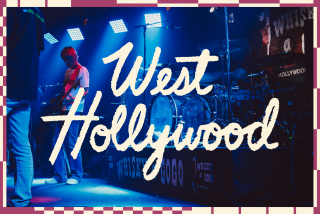Lines around the block at Amoeba Music’s grand reopening in Hollywood
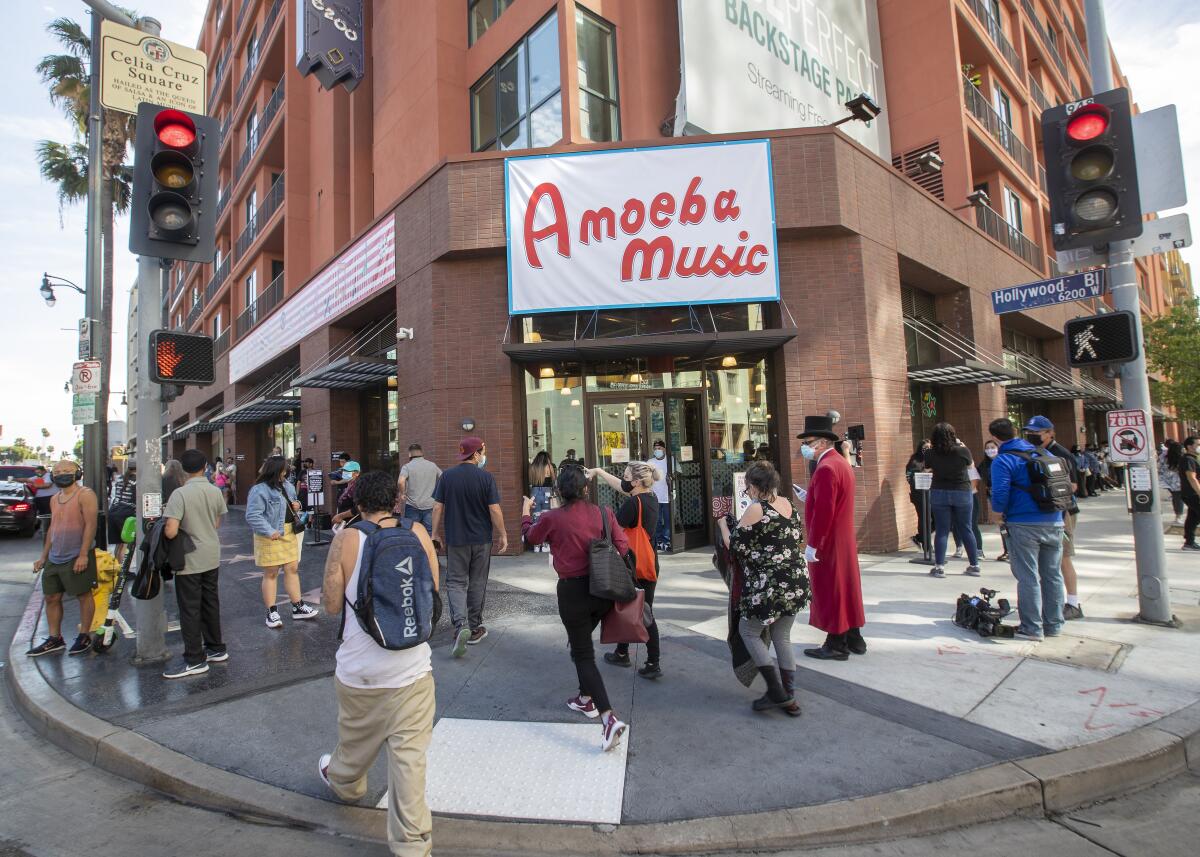
- Share via
More than a year after the pandemic forced it to shutter, and just shy of its 20th anniversary as a Hollywood fixture, music retailer Amoeba Music reopened in its new location Thursday morning.
The moment, marked by the requisite jumbo-scissored ribbon cutting, occurred just before 11 a.m. at Hollywood Boulevard and Argyle Avenue. A line of giddy, young, mostly masked shoppers, many of whom had been waiting since early morning to enter the music Valhalla, stretched south down Argyle and around the block. The queue remained that way for hours.
“The pandemic’s been hard on everyone, so I feel like this is going to boost morale, bring joy again,” said Alonzo Vasquez, who had driven in from the Central Valley with friends to go shopping. His mission: tracking down anything on LP by L.A.-based psych-punk band Osees.
“I feel like this will make times normal. We’re getting spots back,” he said, the lower half of his face obscured by his mask.
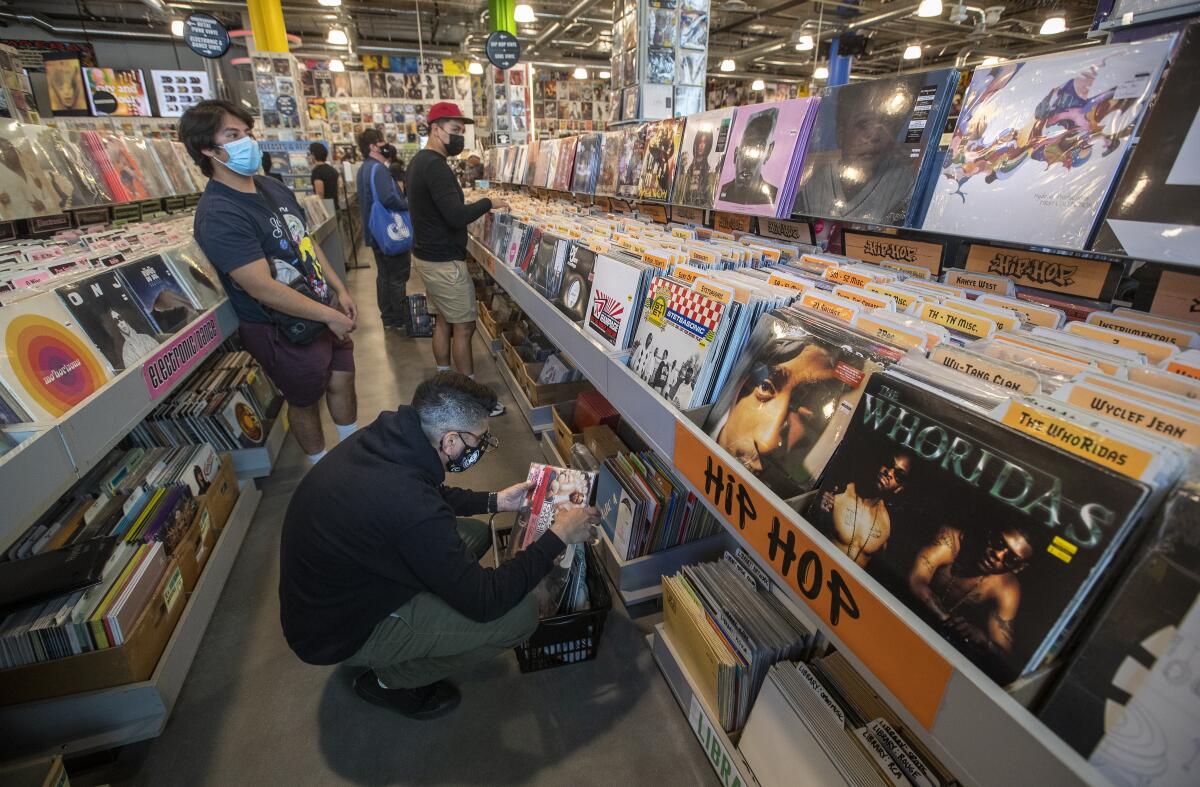
“We’ve been waiting for a year,” said Silver Lake resident Kerri Barta, who was near the entrance on the cusp of access. Until COVID-19, a visit to Amoeba was part of the weekly ritual for her and companion Jason Yates. “It’s been a big hole in our life.”
As the line attested, the same was true of many Angelenos, especially the store’s staff. In mid-March, management called back many of the 200 Amoeba employees rendered jobless by the closure, and on Thursday dozens helped customers eager to explore the store’s 23,000 square feet of retail space.
If, from an outsider’s perspective, Amoeba’s reopening seems to have drawn outsize attention considering the California-based retailer has only two other stores — and you can buy anything you want online — its L.A. reopening marks a moment for one of the world’s most important music centers.
Dense with artists, music producers, music supervisors, studio engineers and, most important, taste-making fans with social media accounts whose movements will help define the sound of tomorrow’s music, Hollywood has had some sort of mega-retailer in the area since Wallich’s Music City opened at Sunset and Vine in the early 1940s. Amoeba assumed that role after Tower Records’ Sunset shop closed in the mid-00s, and the new location (blocks away from Netflix) confirms its status.confirms its status.
On Thursday shoppers entered the store greeted by dozens of aisles filled with product: T-shirts, turntables, collectibles, books, posters, stickers, pins — and, of course, hundreds of thousands of albums, compact discs, cassettes, 7-inch singles and 78-rpm records. Rows of new and used vinyl and display racks showcase fresh releases. Midway into the store, a lower level about five steps down consumes the back half. It mostly contains compact discs.
One reflection of the music retail market in 2021 is the amount of space devoted to vinyl and merch at the expense of CDs. The long-dominant physical format was engineered to replace the less profitable, more finicky vinyl starting in the early 1980s and remained the top-selling physical format until last year, when vinyl sales surpassed CD sales for the first time in decades.
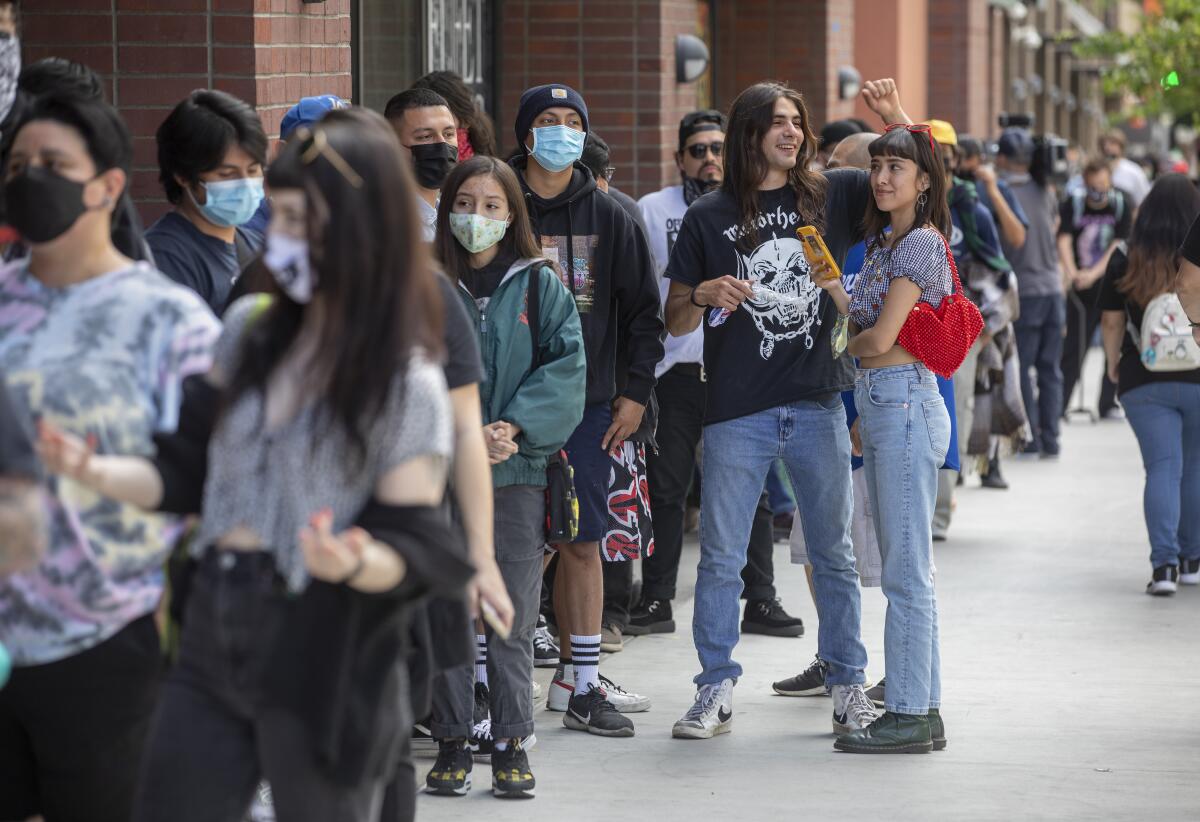
“Certainly, DVDs and CDs are not getting as much premium positioning as they did in the other store, and vinyl is certainly being featured,” co-owner Marc Weinstein told Variety last week, and the shopping experience bears that out.
The store’s live stage is located in the southwest corner of the room, and is centered around the same Shepard Fairey-designed backdrop used on Sunset. Co-owner Jim Henderson, who helped cut the red ribbon on Thursday, said the timeline for in-store sets will be dictated by safety standards. He didn’t want to speculate on when the live sets might return.
The store’s legendary check-out line, which on busy days in the old spot could extend well into the store, runs down the middle of the room with social distance markers every six feet. The store was ready for the rush.
These should be prime times for music retail, especially those that deal in both new and used product. Not only is there an active market for used records, but the volume of new vinyl that’s entered the ecosystem in the past decade ensures fresh stock for years to come. Add in that cassettes and CDs continue to have allegiant devotees and the case can be made that the shops that have weathered the shutdown will come back strong.
Despite the coronavirus crisis, sales of new vinyl in 2020 shot up 29.2% to $619.6 million, according to the Recording Industry Assn. of America; in 2019 that number was $479.5 million. It’s still a fraction of the overall billions earned in the larger music business. In 2020 streaming rose 13.4% over the year prior and generated $10.1 billion, which the RIAA said accounted for 83% of total music industry revenue.
That streaming news struck a deaf ear among those waiting in line, who gathered in scrums of two and three and tried to master the art of being both socially excitable and distanced. Another line extended the other direction down Hollywood; in it were customers toting record crates, bags of CDs and stacks of books they were hoping to trade for new records — or sell to make April rent.
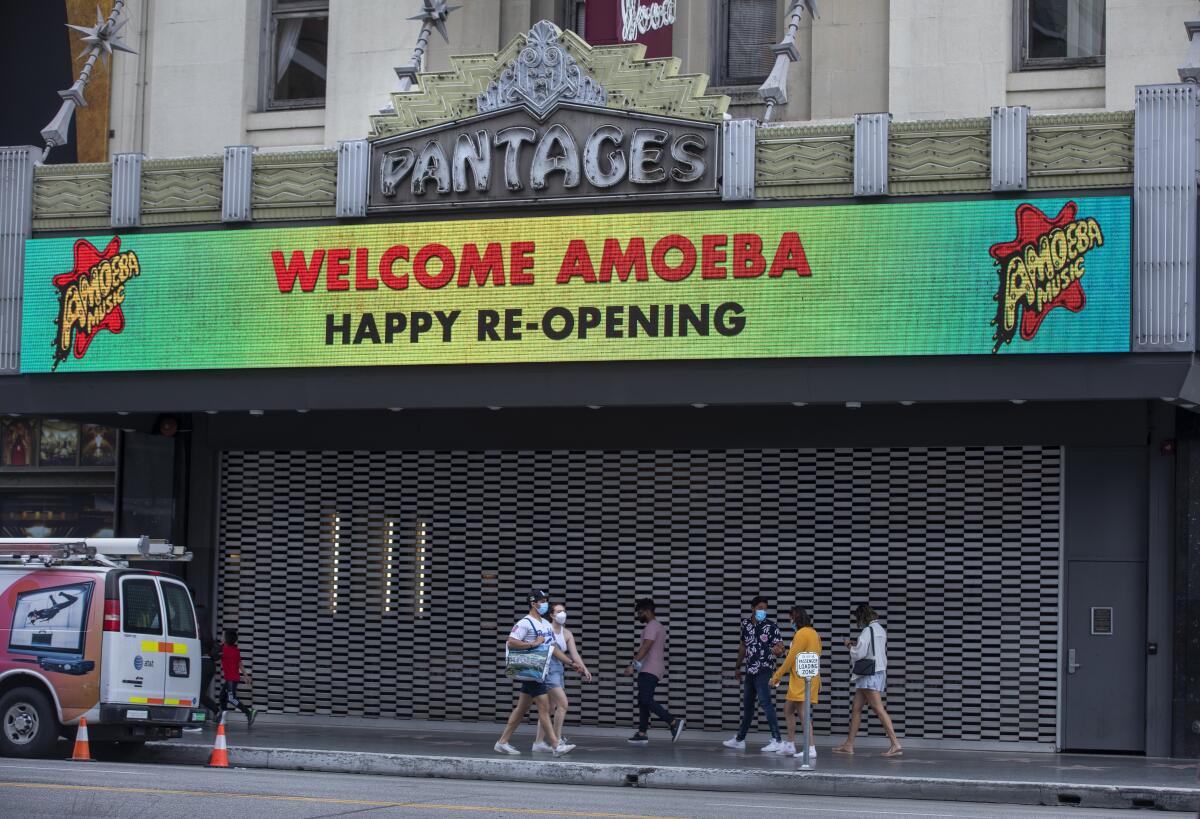
The move had been long planned. In 2020, the pandemic prompted the shop to skip any festivities that might have occurred when it departed its previous home on Sunset Boulevard and sprint toward the new address to be ready when the pandemic allowed. The goal was to open in November, but the fall surge in COVID-19 pushed the schedule to Thursday.
Amoeba opened its first two locations in the San Francisco Bay Area before unveiling its 42,000-square-foot Hollywood megastore in 2001. Housed in a building that Amoeba ownership bought at Sunset and Cahuenga boulevards, Amoeba-Hollywood was a destination from day one — despite overall retail music sales plummeting at the time due to Napster. After Amoeba sold the building to developers in 2015, a relocation was inevitable.
The old spot was a magnet for record-loving celebrities and musicians, and the new spot is sure to be similar.
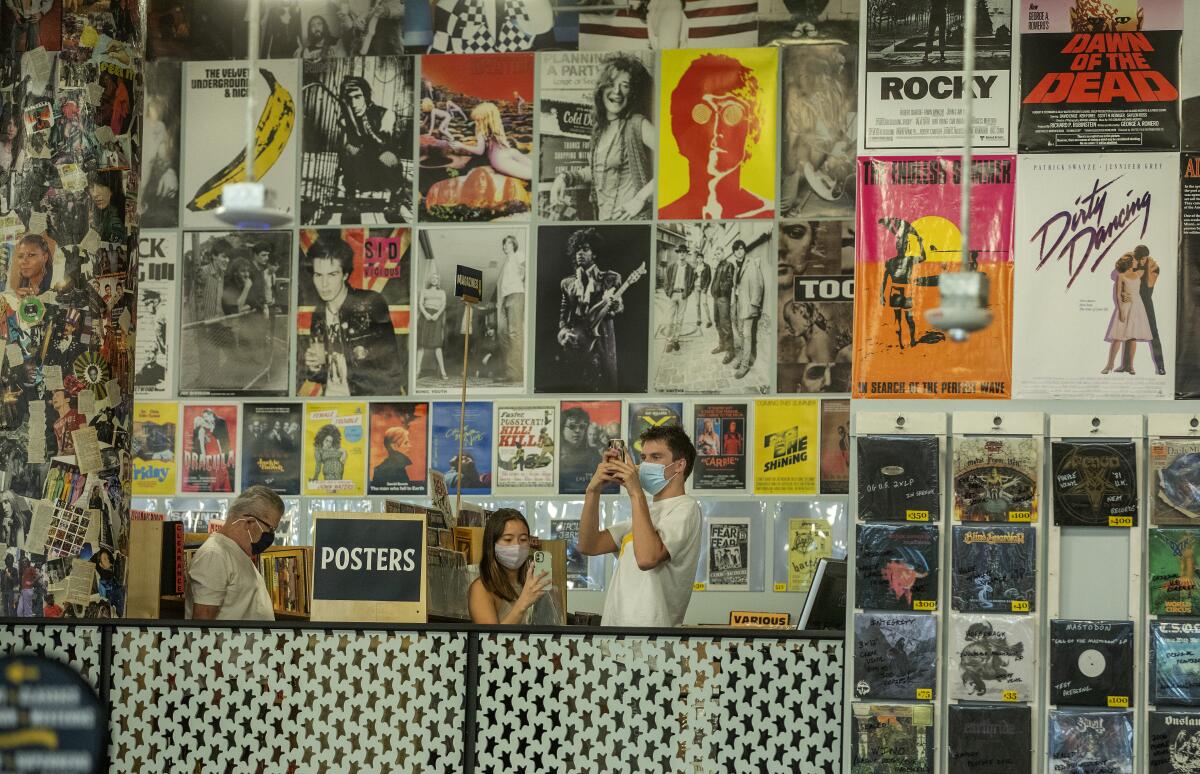
Located in the newly developed El Centro retail and residential complex across Hollywood Boulevard from the Pantages Theatre and the Frolic Room, the new Amoeba has a smaller footprint than the Sunset shop by about a quarter. Still, it’s a vast space with high ceilings and exposed ductwork and already has the feel of a lived-in store. Band and label stickers are collaged on doors, racks are filled, and plexiglass shields protect employees at the help station and check-out counters. The walls of the store are consumed by huge posters of David Bowie, Prince, Beyonce, Patti Smith, the Beatles and dozens more.
To absorb the footage loss, the vinyl and disc shelving units make use of secondary racks at floor level, which formerly held overstock. Stools dot the aisles to ease access to bottom bins; diggers crouched and flipped through jazz records in one corner and hip-hop vinyl a few rows away.
Elsewhere bargain hunters scoured bins for used CDs selling for the same ridiculously low prices that vinyl collectors marveled at in the mid ’90s.
Vasquez wasn’t necessarily looking for bargains, he said as the line approached the door, but something more ephemeral and enduring. “The first time I was here it blew my mind. I still have flashbacks back to that day.”
More to Read
The biggest entertainment stories
Get our big stories about Hollywood, film, television, music, arts, culture and more right in your inbox as soon as they publish.
You may occasionally receive promotional content from the Los Angeles Times.

